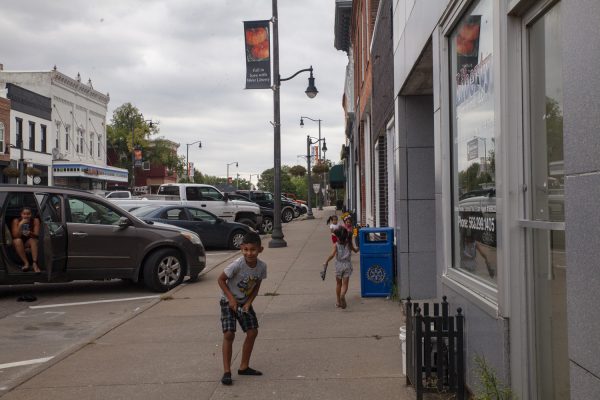Leer este artículo en Español: Habitantes de Iowa puedan pierde acceso a materials de votacion que no esten en Inglés
Spanish speakers in Iowa are likely to be the population greatest affected by Iowa Attorney General Brenna Bird’s appeal that could remove all non-English voting materials in the state.
The appeal, which was announced by Bird’s office on Aug. 30, could overturn a district court’s ruling in June that would enable Iowa counties to provide ballots, voter registration forms, and absentee ballot applications for non-English speakers.

As Iowa’s Latino population grows, critics say the move poses a barrier to their participation in the polls, while proponents say Bird’s appeal falls under the Iowa English Language Reaffirmation Act, which made English the state’s official language and required all official documents to be in English.
Iowa’s elected officials have fought over non-English voting materials and other election-related concerns for more than 20 years. Gov. Reynolds signed a bill into law in 2021 that reduces the time that Iowans have to vote in an election.
“It’s our duty and responsibility to protect the integrity of every election. This legislation strengthens uniformity by providing Iowa’s election officials with consistent parameters for Election Day, absentee voting, database maintenance, as well as a clear appeals process for local county auditors,” Reynolds said in a March 2021 news release.
Former Iowa Gov. Tom Vilsack, a democrat, signed the Iowa English Language Reaffirmation Act into law in 2002.

In 2003, former Iowa Secretary of State Chester Culver made non-English voter registration forms available to the public, leading to a 2008 injunction that blocked non-English voting materials in Iowa until June 2023. The June ruling overturned the 15-year injunction.
Bird said in a September statement that removing non-English voting materials would “protect election integrity” and “defend state law.”
“The Iowa English Language Reaffirmation Act is clear; all official documents are to be written in English, including voter registration forms,” she said in the statement.

Census shows growing Latino population
Representing the fastest-growing minority population in Iowa, Spanish-speaking Latinos are likely to be impacted by the potential removal of non-English voting materials.

According to the State Data Center of Iowa, 128,039 Iowans – who are 5 years and older – speak Spanish at home, up 25 percent from 96,793 Iowans in 2010.
According to the 2020 census, Iowans who identify as Latino make up 6.9 percent of the state’s total population, with 215,986 people self-identifying as Latino in the 2020 census — a 261 percent increase from 82,473 in 2000.
Lina-Maria Murillo, University of Iowa professor of gender, women’s and sexuality studies, history, and Latina/o/x studies, said the track to remove non-English speaking ballots is “not surprising at all” coming from the state of Iowa.
“This should not be seen as some sort of incoherent, random thing that a state just decides to do,” she said. “They don’t wake up one morning and decide to enact these policies. There is a concerted effort, not just in a state but nationally, to take people’s voting rights away.”
Bird’s appeal represents centuries-long systemic racism in the state, Murillo said, which could impact the constitutional right to vote for an entire population.
“This is a direct attack against the population that is actually growing, staying and remaining in Iowa,” Murillo said. “It’s [an] attack on their potential voting rights and the potential voting rights of their children.”

Murillo grew up in California and moved to Iowa City in 2018. In California, the Hispanic or Latino population is 40.3 percent and the white population is the minority, according to the census.
“Materials in California are in dozens of languages,” she said. “There’s a point at which it becomes impossible to deny the changing demographics.”
In a state like Iowa, Murillo said the demographic changes aren’t as drastic, which is why the state doesn’t feel the need to provide non-English ballots.
“The emotional and psychological toll that it takes on communities of color in Iowa … they’re being systematically robbed of their rights, and it is very frightening and dangerous,” she said.

Impact on Iowa communities
Cara McFerren, West Liberty city councilor and third-generation Mexican American, said there is no doubt her community could face obstacles without access to certain voting materials.
“It just seems asinine to me that we would only use English as the only language for all government entities across the board,” she said. “Because if she’s going to do it for elections, then you kind of have to do it for everybody. So why is she singling out just elections?”

West Liberty is one of Iowa’s only cities with a majority of residents who identify as Latino. Of its 3,750 residents, 51.47 percent identify as Latino. The West Liberty City Council is the first in the state to be majority Latino and the West Liberty Community School District has a dual-language program for Spanish-speaking students.
“It’s only courtesy to make sure that all of our students and citizens are treated equitably,” McFerren said. “It’s a natural thing here in West Liberty, and for there to be a ‘one language only,’ when a large portion of our nation is people from other countries that speak other languages, I just don’t understand it.”
Nearly half of West Liberty residents are native non-English speakers and 44.93 percent of West Liberty residents speak Spanish.
“As a society, we have much more important issues to address than worrying about whether or not we’re going to argue over what language is predominant,” McFerren said.
State Rep. Adam Zabner, D-Iowa City, said he is concerned for the Latino community in Iowa City if there is no access to non-English ballots.

“I know a lot of folks that don’t speak English, folks whose young kids are often translating for them, and those people deserve a right to vote,” he said.
Zabner, a child of Venezuelan immigrants and a fluent Spanish speaker, is one of the first Latino members of the Iowa House. After spending late nights at the Capitol, Zabner recalled one “illustrative moment” that made him proud to be a state legislator.
“I was walking down the front steps [of the capitol], and I met a Latino family who spoke Spanish,” he said. “They asked me to take a picture of them in front of the Capitol and they asked me, ‘Is that building open to the public?’”
Zabner said the Spanish-speaking family would not have known the Capitol was open to the public because all its signage was in English.
“They didn’t know that they were able to see the basis of power in our state, where our laws are written,” he said. “If folks don’t even know they’re welcome in our Capitol, just to see where the laws are made, that’s going to impact politics and policies.”

Access to non-English ballots is an intersectional issue
Miriam Timmer-Hackert, co-president of the League of Women Voters of Johnson County, said her No. 1 concern is the legal impact of non-English speakers incorrectly registering to vote.

In Iowa, a person’s registration is canceled if the person is convicted of a felony until the sentence is completed and the governor restores the person’s right to vote. However, Timmer-Hackert said it will be difficult for non-English speakers to know if it’s legal for them to vote.
“It’s just so heartbreakingly complicated because there are narrow exceptions … and when minorities get arrested, they are pretty much prohibited from voting,” she said. “They’re not going to risk getting arrested again just for one vote.”
According to the Iowa Department of Corrections 2020 racial disparity report, Black inmates made up 25 percent of the prison institution population despite accounting for 4.4 percent of the state population, whereas Hispanic inmates made up 7 percent of the prison population and accounted for 6.8 percent of the state population.
“As a voting volunteer, it’s awkward when you’re at a festival and someone comes up and says something in Spanish because you’re asking questions about things like felony convictions,” Timmer-Hackert said. “You’re asking, ‘Are you a citizen?’ and ‘Are you over 18?’ when we really just need a way to have those questions already translated.”
In 2020, Florida Republican Gov. Ron DeSantis had 20 people arrested for voting illegally in the general election, and multiple people were seemingly unaware they did anything wrong. Timmer-Hackert said she is worried something like that will happen in Iowa if people cannot understand the voting materials.
“I don’t want to sign anyone up to vote illegally, because I’m afraid that Brenna Bird would humiliate them and prosecute them just because they’re a minority,” she said. “It really is infuriating that she talks about securing election integrity, but it’s just a way to keep people who only speak Spanish from voting.”

“Voting rights and labor rights are interconnected issues,” Murillo said.
“Latinos are often the children of immigrants being raised in this country, and their parents are doing the best they can to make ends meet,” she said. “And so, they have to have their children go to work, too.”
Gov. Kim Reynolds signed Senate File 542 into law in May, loosening child labor laws in Iowa. The law allows 14 and 15-year-olds to work six hours per day — until 9 p.m. — during the school year. During summer months, they are allowed to work until 11 p.m. Sixteen and 17-year-olds can work the same hours as an adult.
“They don’t want those people to vote,” Murillo said of Iowa politicians. “And they don’t want [them] to vote and because they don’t want them to have control over their life, over their labor.”



